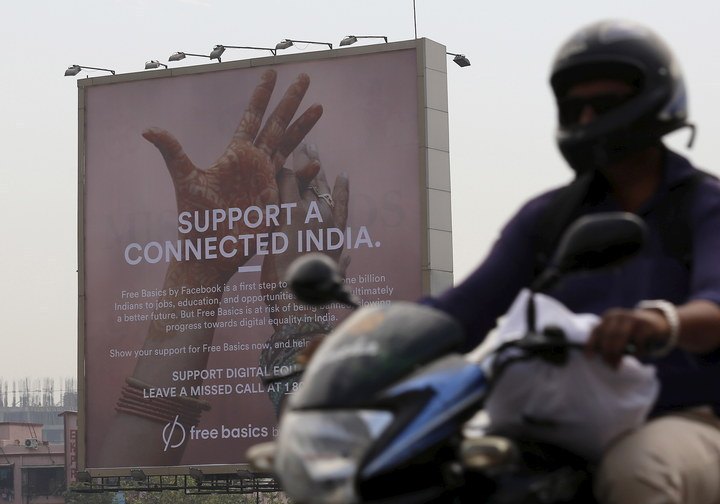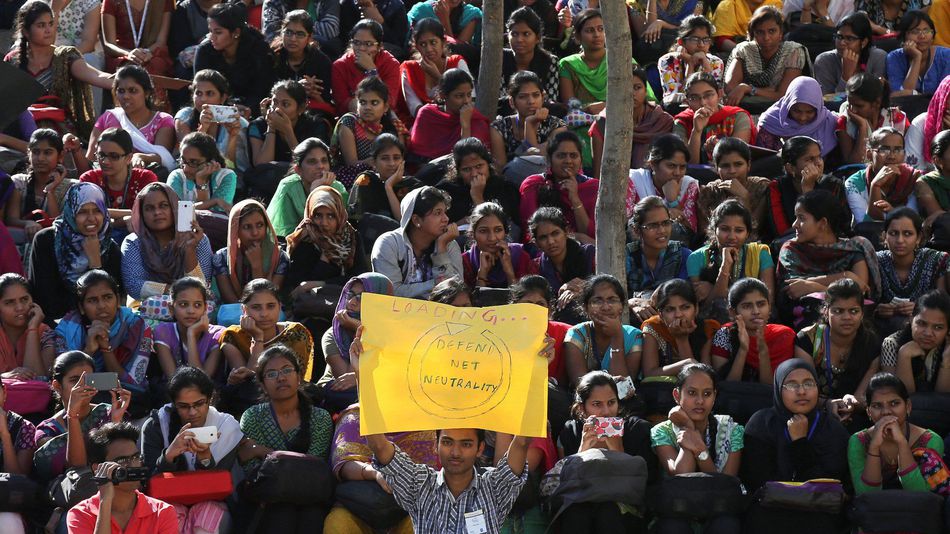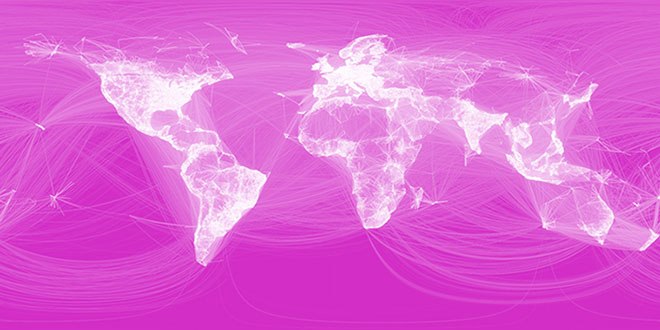Free internet? What could go wrong?

Is Internet.org an altruistic endeavor to provide free internet to the world's poorer population? Or is it really just a user acquisition tool masquerading as a non-profit?
According to its website, “Facebook’s mission is to give people the power to share and make the world more open and connected.”[i] To date, Facebook has been successful in fulfilling its mission statement for its more than 1.18 billion daily users. Mark Zuckerberg, Facebook’s CEO, however, has much loftier goals: he wants everyone on the planet to have access to the internet. To this end, Zuckerberg and Facebook created an initiative in 2013 called Internet.org.
Internet.org is a partnership between Facebook and six companies (Samsung, Ericsson, MediaTek, Opera, Nokia, and Qualcomm). It is founded on the belief, as stated by Zuckerberg, that internet “connectivity is a human right.”[ii] Zuckerberg believes that the internet is the foundation for the “global knowledge economy” that “encourages worldwide prosperity.”[iii] With internet access, farmers in rural India can access information about weather reports or market prices that will allow them to improve their business. School children in Kenya will be able to use the internet as a learning tool in the classroom. Currently, Internet.org is available in 53 countries across Asia, Africa, and the Middle East.[iv] To provide free internet, Facebook has needed to partner with local mobile data carriers who supply data. Unfortunately, this is where most of the controversy surrounding Internet.org started.

Facebook created an Internet.org app (later rebranded to “Free Basics” after numerous PR backlashes). Although technically an application, Free Basics is actually a platform for accessing other applications that have been published within Free Basics. Like any smartphone app, Free Basics uses data provided by a mobile carrier in order to run. Unlike other smartphone apps, telecom providers allow Free Basics to be a “zero-rating” application, meaning that there is no data charge for using Free Basics (while accessing any other application, like Google Maps, counts against a user’s monthly data limit.) Zero-rating goes against “net neutrality”, which is the concept that “internet service providers should provide us with open networks — and should not block or discriminate against any applications or content that ride over those networks”.[v] Broadly speaking, without net neutrality, an ISP could slow down applications created by its competitors or charge users extra to access certain apps. Instead of a free and open internet, companies could be forced to pay to have their content be available or prioritized within a certain ISP’s ecosystem.

Internet.org, many argue, violates net neutrality by making ISPs allow free access to Free Basics while still charging users data to access any other app. Initially, Facebook only allowed select developers access to publish on Free Basics. However, due to criticism of this practice, Facebook now claims that Free Basics is “open to any developer and any application that meets basic technical requirements.”[vi] Even though Facebook claims that competitors such as Google or Twitter can publish apps to Free Basics, some questions remain as to exactly how open the platform is for app developers.
In addition to questions about net neutrality, there are also concerns about the actual goal for Internet.org and its partners. Is Internet.org really about fulfilling Zuckerberg’s idea that “connectivity is a human right”? Or is Internet.org an elaborate hoax being used to bring users into the Facebook ecosystem, with the ultimate goal being monetization of its users? Buzzfeed further investigated Internet.org and came to the conclusion that “ultimately, for both Facebook and its partners, Internet.org is nothing more than a customer-acquisition initiative.”[vii] Mobile data carriers are willing to provide free data for the Free Basics app because it brings in many users that will eventually pay for the broader internet. Indeed, Internet.org’s own website proudly boasts that “over 50% of people who use Internet.org pay for data and access the broader internet within 30 days”. [viii]
While Facebook has weathered numerous PR hits in the past without any serious setbacks (particularly around privacy), Internet.org may not be so lucky. The biggest blow to Internet.org happened in February 2016, when India essentially forced Internet.org out of its country.[ix] Despite a sizable PR campaign within India that included numerous billboards and even an op-ed by Zuckerberg in the India Times, India’s telecoms decided to not allow any “zero-rating” apps.[x] Without question, India and its over 1.2 billion people, of which only 26% have internet access,[xi] was the biggest prize for Internet.org (particularly with China being completely unavailable for Internet.org.)

With 50% of Chinese and roughly 75% of Indians without internet access, and with Internet.org unavailable in both places, it seems unlikely that Zuckerberg will be able to attain his goal of everyone in the world being able to access the internet. However, given the questions surrounding Internet.org and net neutrality, and given the fact that Free Basics may simply be an elaborate user acquisition scheme for Facebook, telecom providers, and app developers, it may be a good thing to see Internet.org fail.
Word Count: 799
[i] Facebook. 2016. Facebook – About. [ONLINE] Available at: https://www.facebook.com/pg/facebook/about/. [Accessed 17 November 2016].
[ii] Mark Zuckerberg. 2013. Is Connectivity a Human Right?. [ONLINE] Available at: https://www.facebook.com/isconnectivityahumanright. [Accessed 17 November 2016].
[iii] Ibid
[iv] Internet.org. 2016. Where we’ve launched. [ONLINE] Available at: https://info.internet.org/en/story/where-weve-launched/. [Accessed 17 November 2016].
[v] Save the Internet. 2016. Net Neutrality: What You Need to Know Now. [ONLINE] Available at: http://www.savetheinternet.com/net-neutrality-what-you-need-know-now. [Accessed 17 November 2016].
[vi] Internet.org. 2015. Free Basics: Myths and Facts. [ONLINE] Available at: https://info.internet.org/en/blog/2015/11/19/internet-org-myths-and-facts/. [Accessed 17 November 2016].
[vii] Caroline O’Donovan and Sheera Frankel. 2016. Here’s How Free Basics Is Actually Being Sold Around The World. [ONLINE] Available at: https://www.buzzfeed.com/carolineodonovan/heres-how-free-basics-is-actually-being-sold-around-the-worl?utm_term=.ewqrlxANL#.qumD9NLP4. [Accessed 17 November 2016].
[viii] Internet.org. 2016. Mobile Operator Partnership Program. [ONLINE] Available at: https://info.internet.org/en/story/mobile-operator-partnership-program/. [Accessed 17 November 2016].
[ix] Pankaj Doval. 2016. Facebook withdraws the controversial ‘Free Basics’ platform from India. [ONLINE] Available at: http://www.gadgetsnow.com/tech-news/Facebook-withdraws-the-controversial-Free-Basics-platform-from-India/articleshow/50947427.cms. [Accessed 17 November 2016].
[x] Mark Zuckerberg. 2015. Free Basics protects net neutrality. [ONLINE] Available at: http://blogs.timesofindia.indiatimes.com/toi-edit-page/free-basics-protects-net-neutrality/. [Accessed 17 November 2016].
[xi] The World Bank. 2016. Internet users (per 100 people). [ONLINE] Available at: http://data.worldbank.org/indicator/IT.NET.USER.P2. [Accessed 17 November 2016].




It will be interesting to see if Facebook allows competing apps such as Google or Twitter to join the platform, like you mentioned. If indeed the “technical requirements” are not a major barrier to entry and any website or app can join the platform, most of the concerns with this initiative could go away and it could be as transformative as Zuckerberg claimed it would.
When thinking about this, I thought that, along with being a way to attract more users to the platform, this would be a tool to eliminate competition in the Internet Service Provider industry. But it seems that it will actually be quite a competitive landscape, as more and more companies seem to be eyeing the same thing. Google has similar intentions, to offer free internet access to everyone on the planet, through a network of satellites. More recently, Elon Musk’s Space X has announce it’s plan to bring super fast Internet to Earth by launching 4,425 satellites into low-Earth orbit. While the feasibility of these plans and the motivation behind them are subject to debate, it seems that, at least, there will still me competition in this field. Of course this also opens up the debate for topics such as information and personal data security, and privacy.
Just because internet.org isn’t perfect, doesn’t mean it should fail. I agree the motives might not be 100% pure and Facebook probably is using this app as a means for customer acquisition. However, people are also benefitting by finally having access to the internet. In a perfect world, google and twitter would be on the app and everyone would have access to an open and free internet. However, that is just not the case here in the US and probably not likely to be the case abroad.
Facebook is putting up the capital and time to create this platform so if they gain a little more benefit, I still think its ok because it is a net positive for the customers. With enough pressure from competitors and governments we will likely see other platforms pop up or changes made to internet.org but this is starting the path to global connectivity which is net positive in the long run.
Interesting article! Although I also question Facebook’s motives, I feel the situation is similar to our case on Ikea’s sustainability efforts; we can reasonably argue that the firms’ efforts are not entirely altruistic, but the benefits created by the “green” efforts of Ikea and Facebook’s global knowledge economy are tangible and real. I agree with AJR’s assertion that competitors and governments will put pressure on Facebook that will create more of a “fair” marketplace over time, but that the positive gain for customers outweighs any potential disadvantages at this point in time. I also believe the global knowledge economy initiative can yield significant benefits from an education perspective in developing regions, and goes beyond what any standalone governments or smaller organizations can currently provide.
Hate to be a cynic, but Facebook’s internet.org endeavor always struck me as nefarious. Facing the prospect of being forced out of India, the scale and aggression of the PR campaign that Facebook launched to fight the ejection had the effect of betraying the company’s true intent: to bury its tendrils into developing regions before the competition can arrive. On one hand, I admire Zuckerberg’s desire to carry out bold initiatives like this project to acquire new customers, and channel as much of the world’s internet traffic as possible through portals under his corporation’s control. He’s the CEO of Facebook, and he’s doing what he thinks is right to continue growing the company. On the other hand, the undertones of imperialism are undeniable to many people who can trace parallels between the arrival of the Internet.org drones and previous events in their national histories. Hopefully the outcome in India will serve as a lesson for FB and its partners to develop a greater awareness of historical context and strike a more thoughtful balance between growth and incursion.